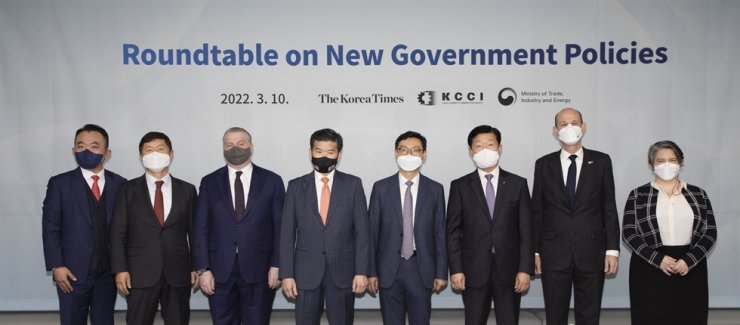
 >
>
>
>
2022.03.25

By Park Jae-hyuk, The Korea Times - Leaders of foreign
chambers of commerce in Korea hoped President-elect Yoon Suk-yeol will create a
business environment that meets global standards, while lowering regulatory
hurdles that have restricted the country from attracting larger investments.
During a roundtable meeting hosted jointly by the Korea
Chamber of Commerce and Industry (KCCI) and The Korea Times on March 10, the
foreign businesspeople anticipated that Korea will be able to become a hub of
Asia if the new president reforms the country's tax system and rules that have
been considered unfair to foreign companies.
American Chamber of Commerce in Korea (AMCHAM) Chairman James Kim mentioned corporate and individual taxes as "pretty serious" issues for the foreign community, asking the new administration to reduce taxes to create more opportunities. He particularly pointed out the inheritance tax on foreign residents here, which has interrupted AMCHAM's goal of helping Korea become the regional headquarters of U.S. firms in Asia, beating Hong Kong, Singapore and Japan in a competition to be the number one destination for multinational companies. "If you die today, your entire global asset will be taxed under the Korean system," Kim said. "Foreign heads of Asia are not going to want to come here for a long term nor want to die in Korea (because of the problem)." He added that Yoon made a pledge regarding the tax issue when he attended a special meeting with AMCHAM members last December when he was a presidential candidate. "It was a tough race, but now it's time to move forward," Kim said. "AMCHAM is ready to work with him and his administration."
French-Korean Chamber of Commerce and Industry (FKCCI) Chairman David-Pierre Jalicon agreed that Korea deserves better recognition from foreign companies, considering its successful management of the COVID-19 crisis. However, he urged Korea to ease regulations if the country does not want to miss a "historical chance" to become a hub of Asia. "There are too many regulations in Korea, which need interpretation," Jalicon said. Specifically, the FKCCI chairman demanded a regulatory sandbox's openness to foreigners, citing the case of an entrepreneur, who suffered difficulties in applying for the program that allows innovative companies to test their products and services on the market without regulations for a certain period of time. He also stressed the need to distinguish a CEO's personal responsibility from a company's responsibility, criticizing the Serious Accidents Punishment Act. The law imposes criminal liability on the head of a company if a fatal industrial accident occurs at a workplace run by that business.
Korean-German Chamber of Commerce and Industry (KGCCI) President Martin Henkelmann shared the view of other participants that deregulation is a "very important" topic for Yoon. In response to a question about one thing he would suggest in a meeting with the president-elect, Henkelmann mentioned more adoptions of the "Ausbildung," dual vocational training that combines apprenticeships in a company and theoretical education at a vocational school. "I would count on my colleagues to mention the topics of deregulation and trade, so I would focus on advocating and lobbying for vocational education and training and for life-long learning," he said. Henkelmann added that the KGCCI will suggest this topic be one of the speaking points of German Chancellor Olaf Scholz, when he meets the new president of Korea.
British Chamber of Commerce in Korea (BCCK) Executive Director Lucinda Walker said that its members look forward to working closely with Yoon and his new administration, strengthening the bilateral relationship between the U.K. and Korea, under the new free trade agreement (FTA) signed between the two countries after Brexit. "BCCK sees the Korean market as key market for many of our members," she said. "Discussing the areas BCCK would like the new government to focus on, I'd like to mention digital trade and clean energy." Introducing herself as a working woman in Korea and a mother of a Korean citizen, Walker also asked the new government to continue to prioritize the success of all genders in the workplace and all forms of diversity in business. "BCCK believes diversity is what makes business strong and resilient," she said.
KCCI backs foreign chambers
KCCI Executive Vice Chairman Woo Tae-hee promised the leaders of foreign chambers that he will fight for them, if they find any laws discriminating against foreign companies. But at the same time, he told them that Yoon has a lot of hurdles to overcome at this moment, because the opposition party is the majority in the National Assembly and the former prosecutor has absolutely no experience in foreign policies. "The landscape of the Korean economy is also not as safe or good as last year," Woo said. "This is a good chance for foreign direct investments (FDI) to play a role." Jung Jong-yung, the Ministry of Trade, Industry and Energy's director general for cross-border investment policy, vowed to deliver what was discussed at the roundtable meeting to Yoon's transition team, if there is a chance. He also emphasized that the government's basic policy is to make a business-friendly economy. "I don't represent the new president, but the direction of the government's policy for FDI will remain favorable to foreign-invested companies," Jung said. "President-elect Yoon made a promise to pursue deregulation and streamline regulatory procedures."
Oh Young-jin, president-publisher of The Korea Times, who moderated the meeting, told the participants that foreigners and foreign businesspeople should continue to be part of Korea, expressing his gratitude for their advice for the president-elect. "I don't think we would have been here, where we are standing now, if we didn't have foreign investors and support from the outside world," he said.